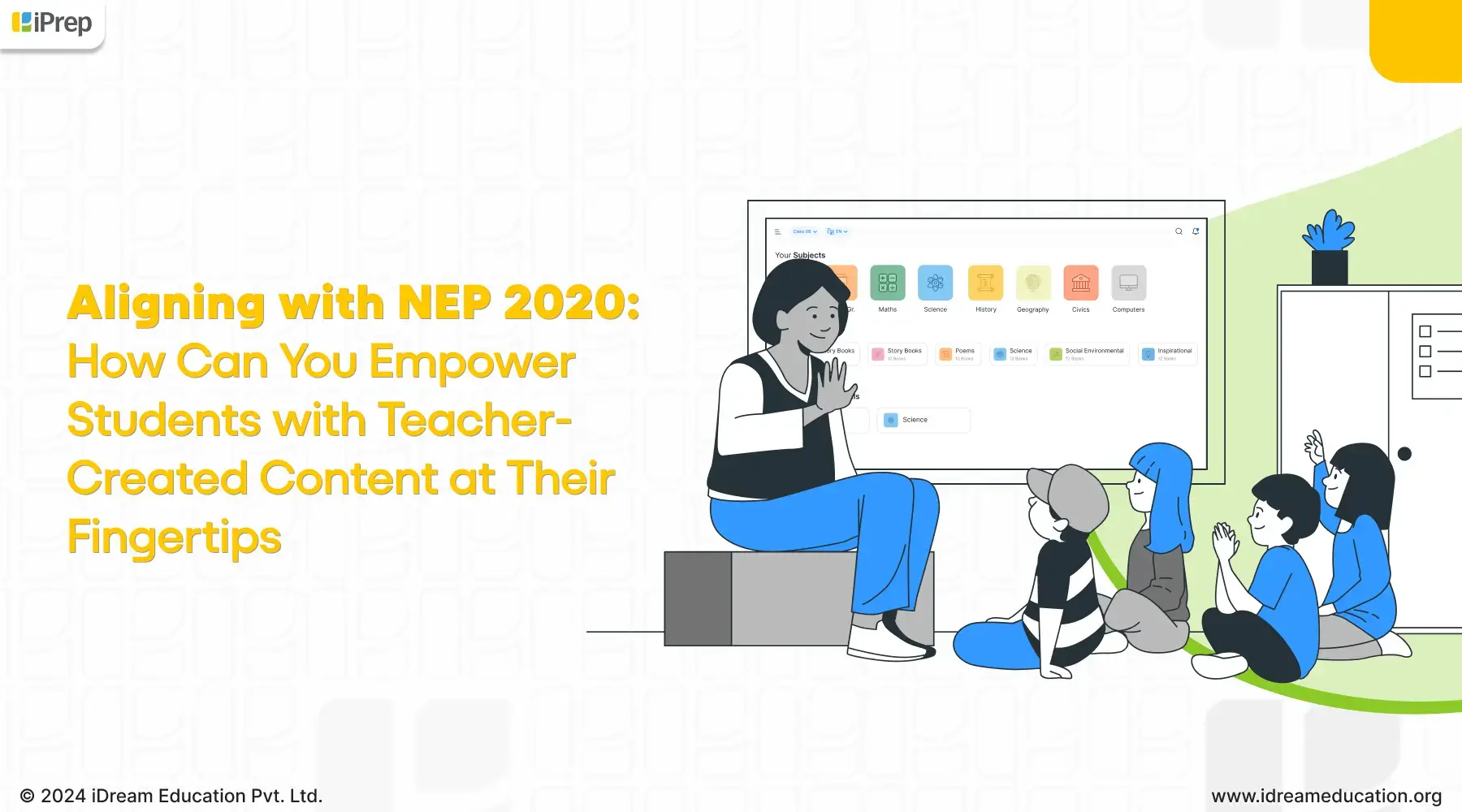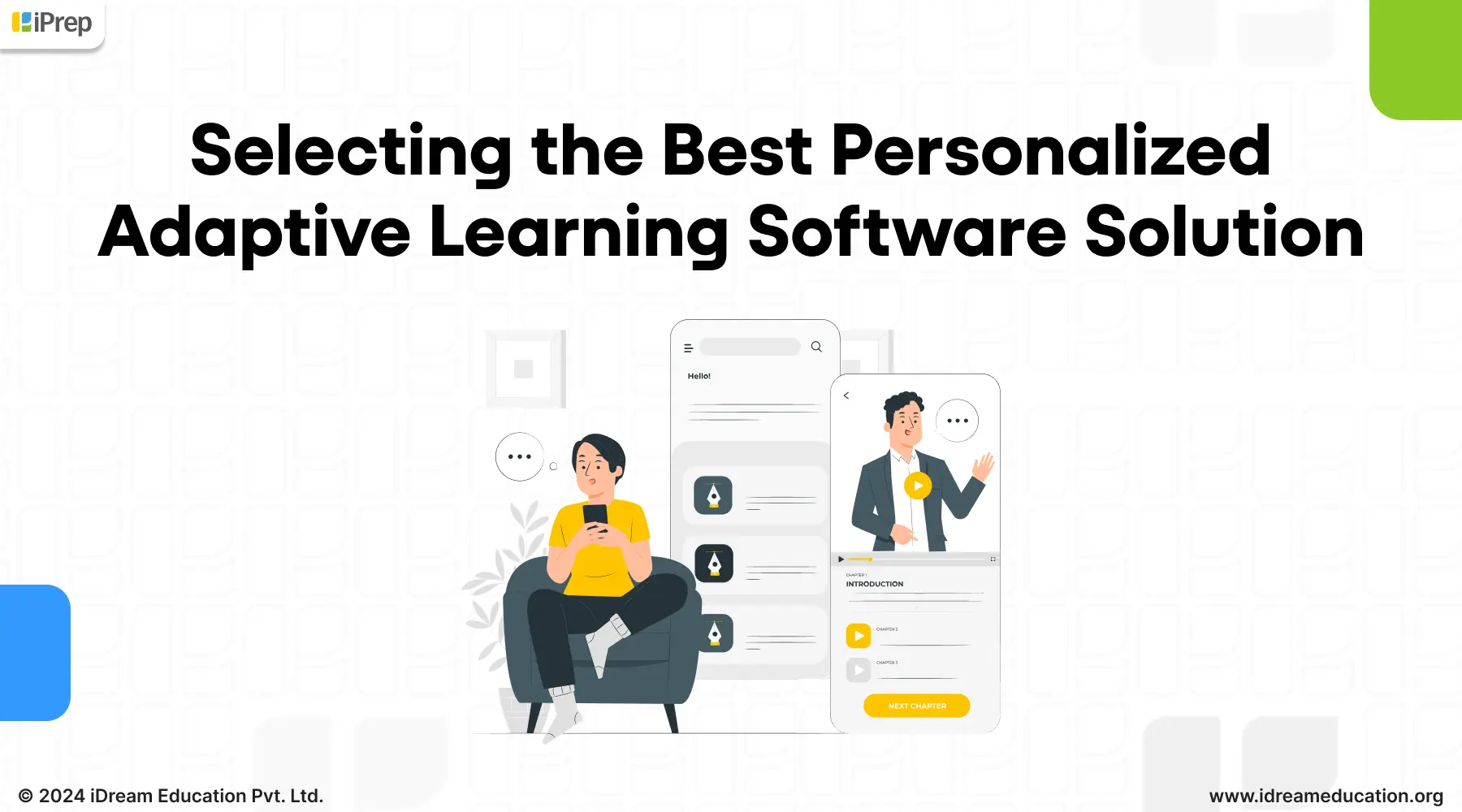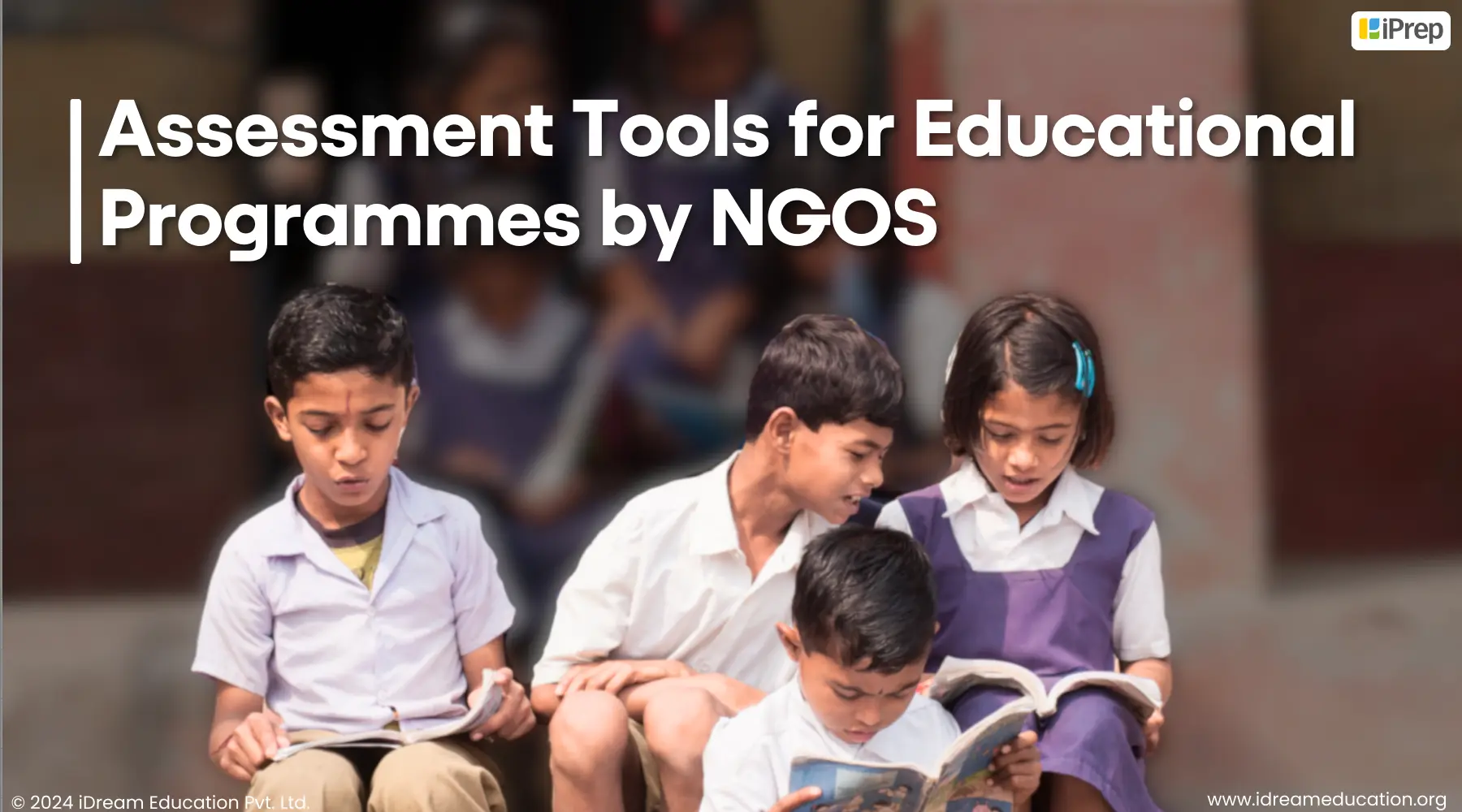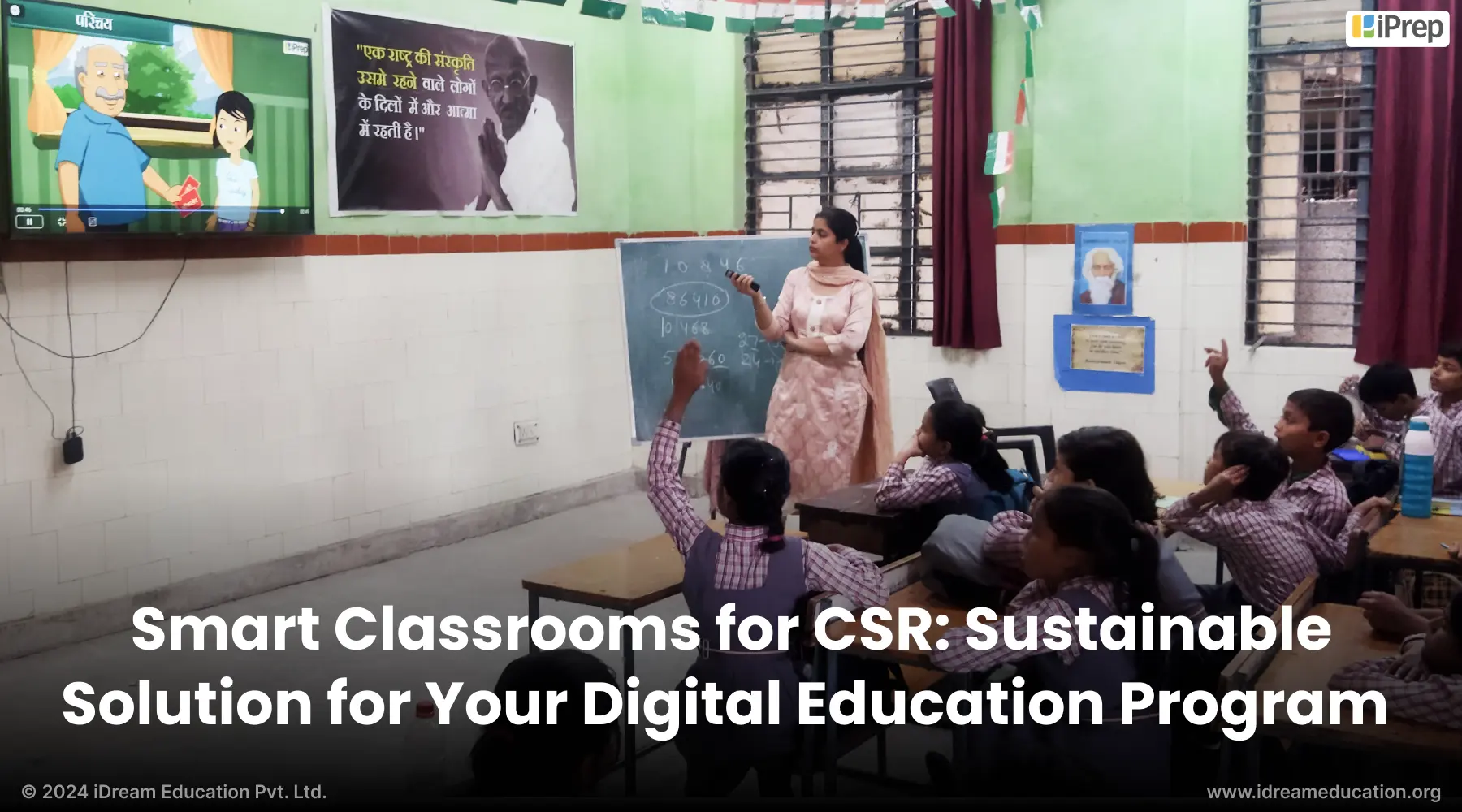Rural Education Programmes by NGOs in India
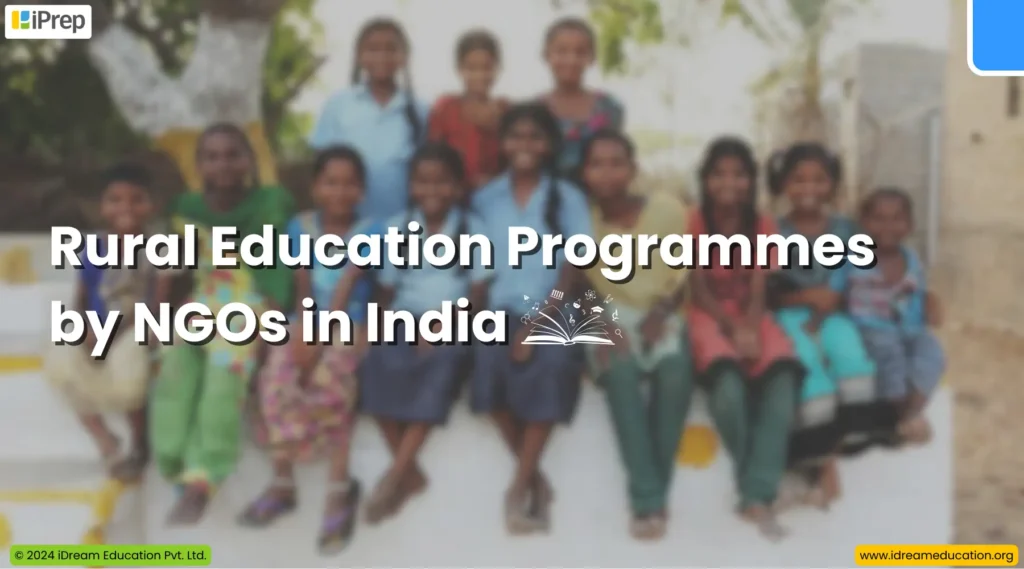
Ensuring compulsory education for all children aged 6-14 is a constitutional mandate outlined in Article 45 of the Indian Constitution. Despite extensive government efforts, challenges persist due to India’s vast and complex socio-economic landscape. Rural education programmes by NGOs play a crucial role in bridging these gaps. They operate at the grassroots level, implementing programs to address educational disparities. Over the years, they have collaborated with governments, CSR initiatives, and service providers to promote educational equity in rural India.
In this blog, we will provide a comprehensive overview of the significant rural education programmes by NGOs in India and also discuss the nature of their role and impact.
Why the need for Rural Education Programmes by NGOs?
Despite significant investments by the government in rural education, there remains a gap in addressing the complex educational challenges faced by rural communities in India. NGOs play a crucial role in bridging this gap by leveraging their grassroots presence to effectively implement rural education programmes. With a focus on community engagement, NGOs can deliver targeted solutions that address contextual needs of education at the local level.
What are rural education programmes by NGOs and what do they involve?
Rural education programmes by NGOs aim to address educational disparities in rural areas through grassroots initiatives. These programs typically involve various interventions such as providing access to quality education, improving infrastructure in schools, offering teacher training, and implementing innovative teaching methods. Additionally, NGOs facilitate technology integration in education, promoting digital literacy and providing access to digital learning resources and tools. Often, rural education programmes by NGOS also involve scholarships and funding opportunities for bright minds. Ultimately, these initiatives seek to empower rural populations with the knowledge and skills needed for socio-economic development.
Importance of Digital Learning in Rural Education Programmes
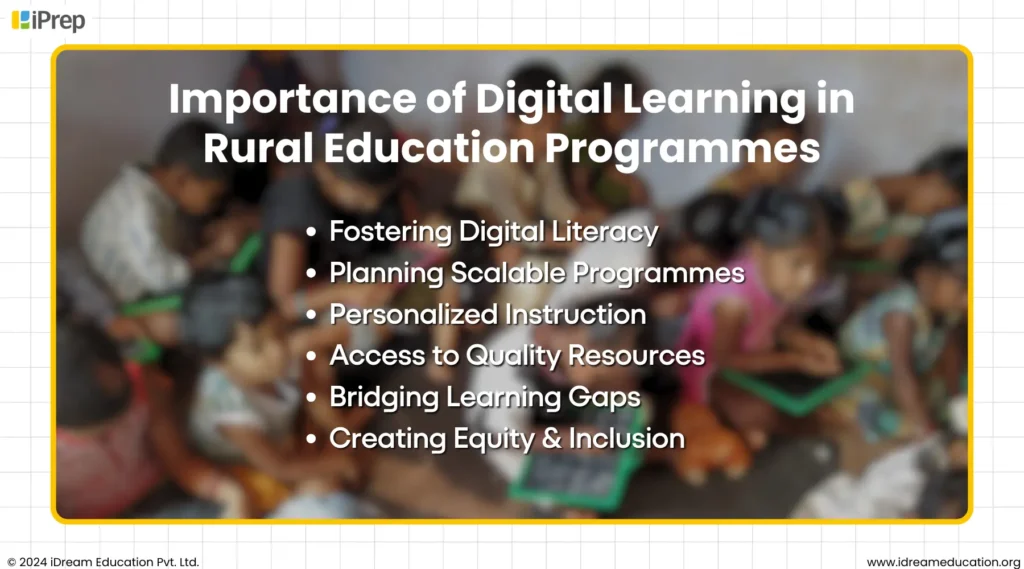
In rural education programs in India, digital learning plays a pivotal role in overcoming geographical barriers and enhancing access to quality education. With the proliferation of digital technologies, students in remote areas can now benefit from interactive learning experiences, diverse educational resources, and personalized instruction. Digital learning platforms facilitate self-paced learning, cater to diverse learning styles, and bridge gaps in curriculum coverage. Moreover, they empower educators with tools for effective teaching, monitoring, and assessment. By integrating digital learning into rural education programs, India can foster equitable educational opportunities, nurture digital literacy, and empower rural communities for socio-economic advancement. Digital learning has also become an important part of rural education programmes by NGOs in India to address educational gaps in these communities.
What are some NGO rural education programmes in India?
Numerous NGOs have dedicated themselves to improving education in rural India, working tirelessly both locally and nationally. Here are some notable organizations and initiatives.
Pratham Education
Pratham focuses on enhancing the fundamental literacy and numeracy skills of children through innovative and cost-effective program models. These models are designed to be scalable and replicable, influencing policy and practices at both central and state government levels. Additionally, Pratham raises awareness about the significance of children’s learning outcomes among various stakeholders in the education sector. Moreover, they provide vocational and skills training to empower youth from socio-economically disadvantaged backgrounds, offering them opportunities for employment. One of their initiatives includes a hybrid learning program that encourages children aged 10-14 to form small groups within their villages, creating a collaborative learning environment. Through this program, digital devices and educational content are provided directly to children, giving them autonomy and flexibility in their learning journey. Community-based groups facilitate choice-based learning, guided by trained coaches and youth members within the community.
SM Sehgal Foundation
S M Sehgal Foundation (Sehgal Foundation) is an Indian rural development NGO established in 1999. Its mission is to enhance the quality of life in rural communities across India. The foundation focuses on identifying gaps and implementing sustainable rural development initiatives. One of its key programs, “Transform Lives one school at a time,” aims to enhance the educational environment for rural schoolchildren by providing access to clean drinking water, improved sanitation facilities, and digital and life skills training. The foundation also works to increase enrollment and reduce dropout rates, particularly among girls, through community engagement with parents, teachers, and children.
Smile Foundation
Established in 2002, Smile Foundation is a non-governmental organization committed to enhancing children’s education and healthcare across India. With a multifaceted approach, Smile Foundation addresses education, healthcare, livelihood, and women’s empowerment initiatives. Their flagship program, Mission Education (ME), provides essential education and healthcare services to underprivileged children. Additionally, Smile Foundation offers the Smile Twin e-Learning Programme (STeP), focusing on empowering disadvantaged youth by imparting crucial skills like English proficiency, computer literacy, and personality development, thus preparing them for employment opportunities in the retail and service sectors.
KC Mahindra Trust
Established in 1953, the K.C. Mahindra Trust has been dedicated to enhancing the lives of deserving students through educational initiatives. Among its notable programs, ‘Project Nanhi Kali’ stands out as one of India’s largest endeavours, aimed at supporting underprivileged girls in completing their ten years of schooling. Through this project, young girls from disadvantaged backgrounds receive academic assistance and yearly provisions of school essentials, fostering a conducive environment for their education and enabling them to attend school with dignity.
eVidyaloka
Headquartered in Bangalore, eVidyaloka is an NGO dedicated to providing education to students in rural government schools across India. Through the innovative use of technology, eVidyaloka connects volunteer teachers with rural schools, creating remote digital classrooms in remote villages. This initiative significantly enhances access to education for students, particularly during the pandemic when traditional schooling was disrupted. The organization’s mission is to establish a virtual learning environment offering high-quality e-learning opportunities for children throughout India, a goal it has effectively achieved by leveraging technology to educate and empower students.
Magic Bus
This organization supports underprivileged children in India aged 12 to 18, equipping them with essential skills to break the cycle of poverty as they transition into adulthood. Through a collaboration with Classplus, a virtual teaching app, Magic Bus offers an online learning platform for young students. Utilizing Classplus, Magic Bus has been able to maintain engagement with students in a virtual classroom environment during the pandemic. Teachers from Magic Bus leverage the platform to assign tasks, communicate with students, deliver educational content, and assess performance, thereby enhancing their learning experience.
Humanify Foundation
The Humanify Foundation is dedicated to revitalizing rural education in India by introducing blended learning approaches, combining online and offline methods, and establishing digital classrooms in remote villages. Collaborating with local communities and a team of dedicated Volunteer Teachers worldwide, the foundation aims to provide children in these areas with access to modern teaching tools for a consistent and enriching learning experience. Beyond traditional academics, students also receive training in various skills essential for a promising future. Humanify has launched ‘Humanify’s Youth Empowerment Centres,’ focusing on equipping young people with the education and skills needed for self-employment and various professions.
Muskaan Dreams
Muskaan Dreams collaborates closely with government and corporate partners to narrow the digital divide in India’s education sector. By introducing technology and digital infrastructure, we support public school teachers and students in adopting technology, thereby enriching the learning journey of marginalized students and preparing them for the digital era of the 21st century.
Humana People to People India
This organization is dedicated to fostering a more inclusive education system that ensures equitable access to opportunities for all learners. It achieves this by developing and implementing teacher education and school programmes aimed at making education purposeful. Their initiatives focus on building knowledge and understanding among learners to empower them to tackle 21st-century challenges effectively. Additionally, the organization also collaborates closely with state governments to develop operational models that support education as a common good.
Deepalaya
Deepalaya is one of the largest operational NGOs, with projects spanning across various parts of the country including, Delhi, Haryana, Uttar Pradesh, Punjab, Kerala, Maharashtra etc. Established in 1979, Deepalaya initially aimed to educate underprivileged children. However, over time, their focus broadened to empower marginalized women, youth, and children through education and vocational training. For four decades, they have been at the forefront of the fight against illiteracy, offering diverse projects in education, women empowerment and vocational training and support.
What is the impact of rural education programmes by NGOs in India?
Rural education programmes by NGOs in India have made a profound impact by addressing systemic barriers and fostering socio-economic development. Through targeted interventions, these programs have significantly increased school enrollment rates, particularly among marginalized communities, thereby promoting inclusive education. NGOs have enhanced educational infrastructure, improved teaching quality, and facilitated access to digital learning resources, transforming the learning landscape in rural areas. Moreover, initiatives such as scholarships and skill development training have empowered individuals, driving economic upliftment and reducing poverty. Overall, NGO-led rural education programs have been instrumental in nurturing talents, promoting social equity, and catalyzing positive change in India’s rural communities.
How iDream Education can contribute to rural education programmes by NGOs in India
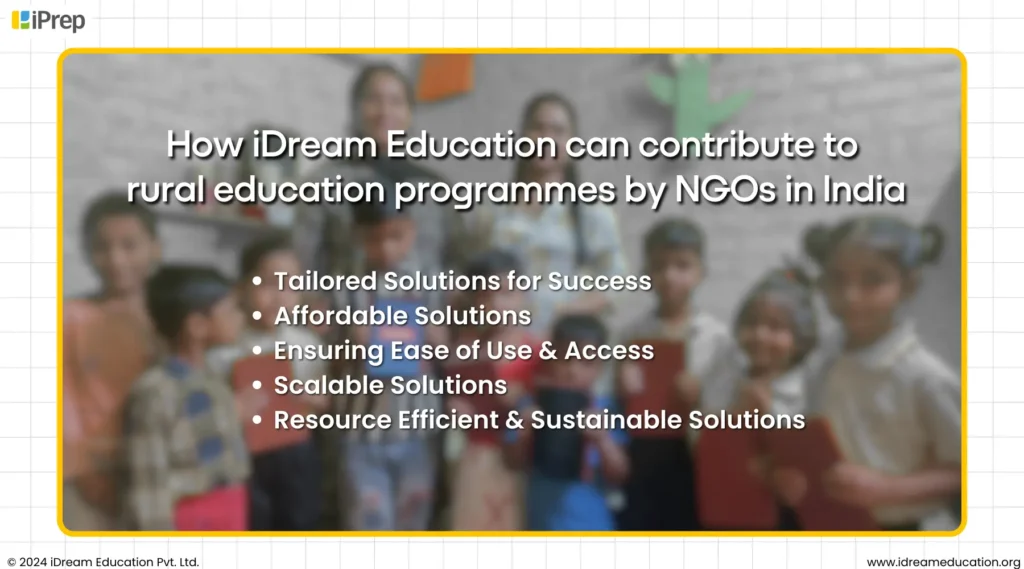
iDream Education, as an EdTech organization, offers digital solutions like smart classes, digital libraries, and educational tablets. Collaborating with leading NGOs and governments, till date we have extended digital empowerment to thousands of schools in remote regions of India. Our commitment to innovation ensures solutions tailored to address practical challenges in rural schools. We prioritize affordability, ease of installation, and resource efficiency, enabling cost-effective implementation even in resource-constrained environments. Not reliant on electricity or internet access, our scalable solutions optimize impact while overcoming existing barriers. With a focus on continuous improvement, iDream Education strives to enhance educational outcomes and empower rural communities through technology-driven education initiatives.
Read about our initiative in the remote regions of East Jaintia Hills of Meghalaya.
Read about the impact of our solutions in remote districts of Jammu & Kashmir.
Conclusion
Rural education programmes by NGOs in India serve as catalysts for transformative change in marginalized communities. By enhancing educational infrastructure and improving teaching quality, these initiatives create conducive learning environments. Moreover, they provide access to digital resources, equipping students with essential skills for the modern world. Through their efforts, NGOs empower rural populations, fostering socio-economic development and reducing educational disparities.


